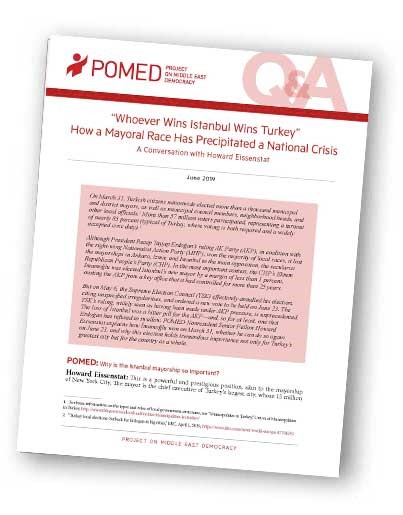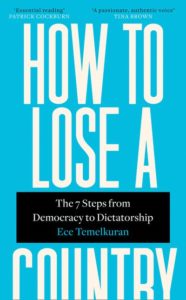 On June 23, somewhere between 8 and 9 million residents of Istanbul will go to the polls to elect their mayor—again. The leading contenders are Ekrem Imamoglu, a dynamic young former district mayor from the Republican People’s Party (CHP), and Binali Yildirim, a seasoned politician and former prime minister from the ruling Justice and Development Party (AKP), analyst Murat Somer writes for Foreign Policy:
On June 23, somewhere between 8 and 9 million residents of Istanbul will go to the polls to elect their mayor—again. The leading contenders are Ekrem Imamoglu, a dynamic young former district mayor from the Republican People’s Party (CHP), and Binali Yildirim, a seasoned politician and former prime minister from the ruling Justice and Development Party (AKP), analyst Murat Somer writes for Foreign Policy:
Imamoglu already won this vote once, on March 31. The result should have ended 25 years of AKP rule in Istanbul—and Imamoglu did serve as mayor of Istanbul for 18 days. But following a series of recounts and dubious AKP complaints, Turkey’s embattled Supreme Election Council canceled the outcome of the election and decided to hold it again.
 “I don’t think there is any question that in a free and fair election, İmamoğlu would win again,” said Howard Eissenstat, Nonresident Senior Fellow at the Project on Middle East Democracy* and Associate Professor of Middle East History at St. Lawrence University. “Indeed, if Turkey’s elections were still truly free and fair, he would have never been removed from office in the first place,” Eissenstat he adds in a new Expert Q&A, “Whoever Wins Istanbul Wins Turkey: How a Mayoral Race Has Precipitated a National Crisis.”
“I don’t think there is any question that in a free and fair election, İmamoğlu would win again,” said Howard Eissenstat, Nonresident Senior Fellow at the Project on Middle East Democracy* and Associate Professor of Middle East History at St. Lawrence University. “Indeed, if Turkey’s elections were still truly free and fair, he would have never been removed from office in the first place,” Eissenstat he adds in a new Expert Q&A, “Whoever Wins Istanbul Wins Turkey: How a Mayoral Race Has Precipitated a National Crisis.”
The AKP’s decision to force the overturning of the Istanbul results underlines the weakness of its democratic bona fides, notes Eissenstat. The AKP’s legitimacy has continued to rest on its claim to represent the democratic will of the people and on its purported respect for elections expressing that will. The undoing of the result in Istanbul highlights just how empty these claims are today.
The growing authoritarianism of President Recep Tayyip Erdoğan’s ruling AK Party (AKP) – detailed in Ece Temelkuran’s How to Lose a Country: The 7 Steps from Democracy to Dictatorship – has invited comparison with Putinism, but….
The Russian model will not work for Turkey, Asli Aydintasbas We are too educated, too prosperous and too westernized to accept ever-increasing authoritarianism. Another annulled election will only herald domestic turmoil.
In the 2000s, Turkey was supposed to show how Islamism can reconcile with democracy, adds Somer, a professor of political science and international relations at Koç University Istanbul, and a visiting scholar at Stanford University. If Imamoglu wins on June 23, Turkey may become an example of how democracy can begin to prevail against polarizing politics, unfettered populism, and religious nationalism—this time, and hopefully, for real.
*A partner of the National Endowment for Democracy.







